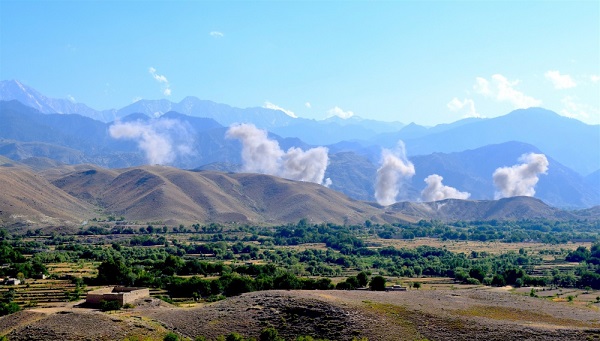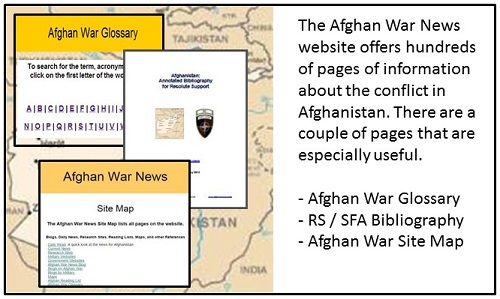
Security
‘Taliban Irreconcilables’. Messaging by the United States and NATO (ISAF and then Resolute Support) in the Afghan conflict over the past 17 years has been interesting. The terms, words, and phases used to describe the ever-increasing progress of the Afghan government and security institutions have been creative. A new term that has come into use (probably for about a year now) is ‘Taliban irreconcilables’. Evidently these are the Taliban that are not receptive to reintegration or reconciliation and therefore the ones that are being attacked by the U.S. and Afghan security forces. So, apparently, there are ‘reconcilable Taliban’ who are ready to engage in peace negotiations and who will soon be ‘reintegrated’ and ‘reconciled’ – and who, perhaps, are not being targeted.
Two More Districts Fall. The Taliban overran two districts n Paktika province on July 24, 2018. The fall of the districts centers took place after two days of heavy fighting. The Taliban have controlled most of the area of the districts for some time but the district centers have now been captured. Only four of the 19 districts in the province are controlled by the government; the remainder are either controlled or contested by the Taliban. (FDD’s Long War Journal, July 24, 2018).
Ghazni Province – Dominated by the Taliban. With the exception of the provincial capital the insurgents control a key province south of Kabul. While government troops and police occupy district centers and some outposts the Taliban roam freely throughout most of Ghazni. A detailed analysis of the security situation in Ghazni is provided here by the Afghanistan Analysts Network (AAN – July 25, 2018).
ANDSF
Significant Casualties. Since the end of the government’s ceasefire in June 2018 the Afghan National Defense and Security Force has suffered some significant casualties. Bill Roggio of The Long War Journal reports. (Threat Matrix, July 24, 2018).
New Regional Force. In the later part of 2017 the Ministry of Defence (MoD) has established a new force to improve security in areas cleared of insurgents. The Afghan Army Regional Force will move into and secure areas where the Taliban and other insurgents recently held territory. The new force – in the winter of 2017 it was referred to as the Afghan Territorial Army (ATA) – will be made up of retired soldiers and policemen. Recruitment is taking place in Laghman, Kapisa, Kandahar, and Herat provinces. Read “Afghanistan to Create Regional Force for Areas Cleared of Taliban, IS”, Voice of America, July 23, 2018.
ANDSF and ‘Public Engagement’. An important part of the effort to end the conflict in Afghanistan should be the use of information operations (IO) by the Afghan National Defense and Security Forces. Unfortunately, the reducing of Coalition advisors at the tactical level has diminished the capability and capacity of the ANDSF to conduct IO at the local level. Read more in “Addressing the Divide Between Necessity and Capability for Public Engagement Within the Afghan Security Forces”, Small Wars Journal, July 24, 2018.
More ScanEagle Drones. The U.S. Department of Defense has modified a contract that enables the U.S. to provide 27 additional unmanned aircraft systems. (Khaama Press, July 25, 2018).
Australia to Help in UH-60 Transition. The U.S. is outfitting the Afghan Air Force (AAF) with 159 expensive, complicated, and difficult to maintain UH-60 Black Hawk helicopters over the next several years. The UH-60s will replace the easy to maintain and environmentally suitable Russian Mi-17s that the AAF is quite accustomed to flying and maintaining. To help the U.S with this seemingly monumental task Australia is stepping up to the plate (a U.S. baseball plan for all you Europeans reading this). (ABC.net.au, July 25, 2018).
Resolute Support
Bulgarian Rotation Complete. About 150 Bulgarian service members have returned from their 6-month long tour in Afghanistan. The contingent included a security company, some advisors, and staff members who served on the NATO HQs staff in Kabul. The returning contingent was replaced with a contingent of equal size who are now starting their Afghan tour.
RS HQs Update – or ‘Pushing the Peace Agenda’. In the absence of any real news about the improvement in the security situation the commander of Resolute Support provided a dose of optimism with his remarks about an increasing chance that the Taliban might come to the negotiation table. (Editor’s comment – “fat chance”). (Resolute Support News Release, July 25, 2018).
Watch a 5-minute long video of the press conference held on July 23rd by General John Nicholson (RS Mission cdr) and General Joe Votel (CENTCOM cdr). (RS HQs, July 24, 2018).
Peace Efforts
Working Strategy Improves Peace Prospects. Apparently U.S. senior military officers in Afghanistan believe that the South Asia strategy rolled out in August of 2017 is providing an incentive to the Taliban to be more receptive to opening peace talks. On Monday, July 23rd General John Nicholson said (Reuters, Jul 23, 2018). that “The advancement toward the reconciliation goal in President Trump’s strategy has seen progress in the last year that we haven’t seen in the previous 17 years and that is significant.” Hmmm. That seems like a very optimistic statement given the Taliban’s history of participation in past peace talk efforts and the Taliban’s increasing control of population and territory.
Moscow Talks. Russia has invited the Taliban to Moscow to engage in peace talks. Russia believes that it can act as an effective mediator between the Taliban and the Afghan government. There are probably a number of reasons for Russian engagement on this issue – and probably none of them have anything to do with actually negotiating an end to the conflict. Read more in “Why Has Russia Invited the Taliban to Moscow”,The Diplomat, July 21, 2018.
Another Ceasefire? Strategic Objective vs Tactical Risk. President Ghani is looking at conducting another ceasefire that would occur during late August – coinciding with another Islamic holiday. The Resolute Support command is supporting this effort. However, any gains in moving forward in getting the Taliban involved in peace talks have to be balanced with the gains that the insurgents make at the local level on the battlefield. (Stars and Stripes, July 24, 2018).
Governance, Politics, and Society
Elections. The 2018 parliamentary election and 2019 presidential election are – as of now – still going to happen. The voter registration period for 2018 has concluded but a lot of work remains. Read more in a statement by the United Nations Security Council (July 23, 2018).
Dostum’s Return. First Vice President Dostum has returned to Afghanistan from his 14-month long ‘medical leave’ trip to Turkey. He still faces legal challenges concerning allegations that his staff raped and tortured a political rival but is expected to resume his governmental duties. On the day of his return – via the international airport in Kabul – a suicide bomber killed 14 people and wounded many more that were part of a crowd of supporters receiving him at the airport. General Nicholson, the Resolute Support Mission commander, said on Monday during a press conference (Pajhwok.com, Jul 23, 2018) that he believed the return of Dostum from exile would help improve the security situation in the northern region of Afghanistan.
Supporting Afghan Treasures. The government of Italy is taking a supporting role in preserving Afghan treasures. Read more in “Discovering Afghan Treasures with the Italian Archaeological Mission”, Kabul Embassy, July 23, 2018.
Afghan Conflict References

Afghan War News offers some informational references about the long-running Afghanistan conflict that could be useful to those who work in the military, humanitarian, or business sectors in Afghanistan.
Glossary of Terminology Used in Afghanistan
www.afghanwarnews.info/glossary/afghanglossary.htm
Annotated Bibliography for Resolute Support
www.afghanwarnews.info/pubs/RSM-Bibliography.htm
Site Map for Afghan War News
www.afghanwarnews.info/sitemap.htm
Miscellaneous News
Caitlan Coleman Returns to US. A former Taliban hostage and her children have returned to the United States. Coleman, her husband, and their children were held hostage by the Taliban in Afghanistan and then late in Pakistan. Her husband has remained in Canada. The couple was kidnapped while backpacking through Afghanistan. (The Telegraph, July 25, 2018).
Afghan Interpreters – A Key Piece in the Conflict. American, NATO, and partner-nation troops quickly find out that to be able to communicate with their Afghan counterparts they will need an interpreter. Many interpreters work for years for the Coalition military units; often at great danger to themselves and their families. One would think that the U.S., UK, and other nations would make it easy to immigrate to the countries that they served – but not so much. Read an article by Priscilla Alvarez entitled “They Fought Terrorists, but Can’t Get the Visas Congress Promised”, The Atlantic, July 25, 2018.
Books and Reports
Report – Afghan Women Police. The Women & Peace Studies Organization based in Kabul, Afghanistan has published a 28-page report entitled Afghan Women Police: Tomorrow’s force for inclusive security, July 2018. The report can be accessed at the WPSO website.
Book – Directorate S. Ann Wilkens – a former Swedish Ambassador to Afghanistan, writing for the Afghanistan Analysts Network (AAN) reviews Steve Coll’s book about the Central Intelligence Agency’s role in the Afghan conflicts over the past several decades. Coll takes a close look at a subdivision of the Pakistan’s inter-services intelligence directorate that works the Afghan conflict – covering the period of 2001 to 2016. Wilkens take away from the book is that:
1) geography is important – Pakistan’s view of having ‘strategic depth’ to the east will not go away; therefore it will continue its aim to keep Afghanistan destabilized.
2) Relations between India and Pakistan have to improve before the situation in Afghanistan starts to improve.
Videos
EAP Deploys in Northern Afghanistan. A five minute long video provides scenes from a deployment of an Expeditionary Advisory Package (EAP) to the Afghan northern city of Maimanah to provide training, advice, and assistance to the ANDSF. (NATO Channel, posted 5 July 2018).
German Soldiers Arrive MeS. A four-minute long video (no commentary) shows scenes from the arrival of over 100 infantry soldiers from Germany arriving for their tour at Mes-e-Sharif in northern Afghanistan. The soldiers mission is to provide force protection for German advisors to the ANDSF. (RS HQs, April 17, 2018).
Camp Marmal – Force Protection Company. A multinational force protection company made up of different nations provide protection to advisors from Train, Advise, and Assist Command – North (TAAC-North) who work with ANDSF counterparts. Video provides scenes from pre-mission meeting, convoy preparation, and convoy movement. (RS HQs, April 18, 2018).
TAAC N Counter IED Training Course. Incoming personnel reporting to Camp Marmal in Mazar-e Sharif learn about the IED threats in Afghanistan during a counter IED course. (RS HQs, July 26, 2018, 2-mins).
www.youtube.com/watch?v=YjaCvYMxZco
*********
Photo: U.S. Air Force drops bombs in a terrain denial air attack in foothills of eastern Afghanistan to prevent ISIS-K fighters from returning to territory they once held. U.S. Green Berets and Afghan Commandos conducted a month-long clearing operation to free areas from the control of Islamic State Khorasan Province fighters. Photo taken on 19 June 2018, U.S. Navy Lt. Amy Forsythe, NATO Special Operations Component Command – Afghanistan (NSOCC-A).
View past posts about Afghanistan:
www.sof.news/category/afghanistan/